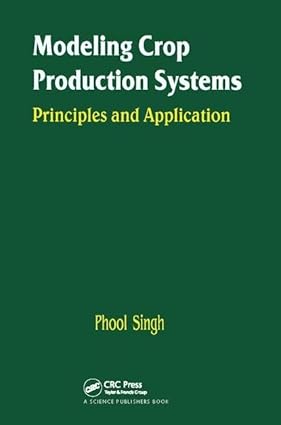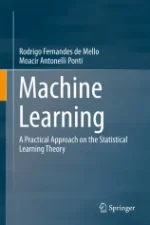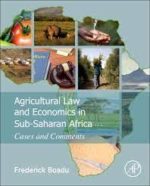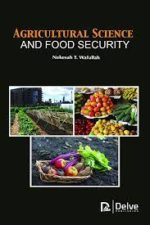The use of simulation models is a necessity and also an aid in the decision-making process in sustainable agricultural systems. Organizing the experimental knowledge of crop production systems without the book keeping and deductive methods of mathematics is very difficult. This book aims to guide readers in the process by which the properties of the systems can be grasped in the framework of mathematical structure with minimal mathematical prerequisites. The objective of this book is to help the undergraduate, graduate and post-graduate students in the disciplines of agronomy, plant breeding, agricultural meteorology, crop physiology, agricultural economics, entomology, plant pathology, soil science and ecology (environmental science). This book may also be useful for administrators in various agricultural universities in order to direct research, extension and teaching activities. Planners at national and state levels may also benefit from this book
Modeling Crop Production Systems: Principles and Application 1st Edition by P Singh (Author)
KSh 5,800.00
The use of simulation models is a necessity and also an aid in the decision-making process in sustainable agricultural systems. Organizing the experimental knowledge of crop production systems without the book keeping and deductive methods of mathematics is very difficult. This book aims to guide readers in the process by which the properties of the systems can be grasped in the framework of mathematical structure with minimal mathematical prerequisites. The objective of this book is to help the undergraduate, graduate and post-graduate students in the disciplines of agronomy, plant breeding, agricultural meteorology, crop physiology, agricultural economics, entomology, plant pathology, soil science and ecology (environmental science). This book may also be useful for administrators in various agricultural universities in order to direct research, extension and teaching activities. Planners at national and state levels may also benefit from this book
2 in stock
| Categories: | Agriculture, Science & Mathematics |
|---|
Related products
-
Machine Learning A Practical Approach on the Statistical Learning Theory
KSh 19,000.00This book presents the Statistical Learning Theory in a detailed and easy to understand way, by using practical examples, algorithms and source codes. It can be used as a textbook in graduation or undergraduation courses, for self-learners, or as reference with respect to the main theoretical concepts of Machine Learning. Fundamental concepts of Linear Algebra and Optimization applied to Machine Learning are provided, as well as source codes in R, making the book as self-contained as possible.
It starts with an introduction to Machine Learning concepts and algorithms such as the Perceptron, Multilayer Perceptron and the Distance-Weighted Nearest Neighbors with examples, in order to provide the necessary foundation so the reader is able to understand the Bias-Variance Dilemma, which is the central point of the Statistical Learning Theory.
Afterwards, we introduce all assumptions and formalize the Statistical Learning Theory, allowing the practical study of different classification algorithms. Then, we proceed with concentration inequalities until arriving to the Generalization and the Large-Margin bounds, providing the main motivations for the Support Vector Machines.
From that, we introduce all necessary optimization concepts related to the implementation of Support Vector Machines. To provide a next stage of development, the book finishes with a discussion on SVM kernels as a way and motivation to study data spaces and improve classification results.
-
The Science of Agriculture: A Biological Approa
KSh 27,580.00THE SCIENCE OF AGRICULTURE: A BIOLOGICAL APPROACH, Fifth Edition, masterfully introduces the biological sciences and explores the influences of these sciences on modern agricultural practices and the agricultural industry. Reader-friendly and superbly illustrated, this highly practical text explains not only the �how� of agriculture, but also the �why� behind agriscience, presenting information on plant and animal systems, soils, cell functions, genetics, genetic engineering, plant and animal reproduction, entomology, biotechnology, and environmental concerns. Additionally, the text spotlights career opportunities and discusses new directions in agriculture, including topics such as no-till crops, high-pressure processing in food preservation, fracking, and more, to further engage you with today�s agricultural world.
-
Tropical Roots and Tuber Crops: Cassava, Sweet Potato, Yams and Aroids (Crop Production Science in Horticulture)
KSh 8,260.00Root and tuber crops are important to agriculture, food security and income for 2.2 billion people in developing countries. These species produce large quantities of dietary energy and have stable yields under difficult environmental conditions. This second edition of Tropical Root and Tuber Crops is an authoritative treatment of four important root and tuber crops: cassava, sweet potato, yams, and aroids.
The same format is followed for each crop: Origin and History, Taxonomy and Botany, Breeding and Genetics, Developmental Physiology, Agronomy, Pests and Diseases, Post-Harvest Quality and Marketing. This new edition reviews the scientific literature produced during the last decade and presents major technical advancements. Modern molecular tools have been used to clarify the phylogeny, taxonomy and origin of these species. Similar advances have been made in physiology, agronomy, pathology and product chemistry. It is essential reading for students, researchers and horticulturists.
-
Agricultural Law and Economics in Sub-Saharan Africa: Cases and Comments
KSh 17,400.00Agricultural Law in Sub-Saharan Africa: Cases and Comments introduces the subject of agricultural law and economics to researchers, practitioners, and students in common law countries in Sub-Saharan Africa, and presents information from the legal system in Botswana, Gambia, Ghana, Lesotho, Malawi, Nigeria, Sierra Leone, South Africa, Swaziland, Tanzania, Zambia, and Zimbabwe. The law and economics approach entails the use of quantitative methods in research. This is consistent with the expectations in an applied economics field such as agricultural economics.
Covering the general traditional law topics in contracts, torts, and property, the book goes further to introduce cutting-edge and region-relevant topics, including contracts with illiterate parties, contract farming, climate change, and transboundary water issues. The book is supported by an extensive list of reference materials, as well as study and enrichment exercises, to deepen readers’ understanding of the principles discussed in the book. It is a learning tool, first and foremost, and can be used as a stand-alone resource to teach the subject matter of agricultural law and economics to professionals new to the subject area as well as to students in law school, agricultural economics, economics, and inter-disciplinary classes.
- Offers research findings on such topics as food safety, climate change, transboundary natural resources, international sale of goods, patents, and trademarks to highlight the future sources of pressure on the agriculture industry
- Uses case-studies to provide real-world insights into the challenges and considerations of appropriate agricultural law development
- Challenges readers to carry out their own research in their areas of study, and to gain some understanding of the relationship between law, economics, and statistics
- Includes extensive resources, such as chapter summaries, study questions, and challenge questions at the end of each chapter to assist instructors and students in gaining full benefits from using the book
- Provides separate instructor and student study guides, a test bank, and test bank answers, in hardcopy and electronic formats
-
Disaster Management, Corporate Social Responsibility and Conservation Issues
The vulnerability of various regions of the world towards disasters, both natural and anthropogenic, is widely known. Disasters such as landslides, earthquakes, floods have a long-lasting effect on the environment and socio-economic systems. These disasters have been occurring at regular intervals of time and the economic and social cost of these mount every year.
Disaster Management, Corporate Social Responsibility, and Conservation Issues deals with the fundamental principles and current practices in the field of disasters. The book covers various environmental challenges and issues related to natural disasters that affect all forms of life. It discusses how disasters can be managed and the role corporate social responsibility can play in addressing the issues. The book also provides conservation steps that can help in mitigating disasters. Experts from different fields have contributed diverse, technical, and best concepts. Through the writings, the book will make readers better prepared for the challenges of disaster management and strive towards sustainable development.
Contents:
- A Review of Flood Disaster in Assam State of India: Causes and Impacts
- Rampant Tourism an Ecological Disaster in Waiting: Case study from Ladakh
- A Retrospective Analysis of Earthquake Hazards and Hydropower Development in Indian Himalayan Region
- Factors Causing Landslides and Importance of Parameters during Landslide Hazard Zonation: Experiences from Kumaun Himalayas
- Major Natural Disasters and Livelihoods Improvement of Disaster-affected Areas through Horticulture in Uttarakhand
- Effects of Climate Change on Agriculture: Indian Perspective
- Potentially Important but Neglected Roadside and Wasteland Medicinal Plants of Uttarakhand
- Natural disasters in hilly areas: special reference to people living in Indian Himalayan Region
- Ambient air pollution and its sources in the semi-rural sites in the Northwestern Indian Himalayas
- Diversity analysis, indigenous uses and current status of medicinal plants in Mohalkhad Watershed of Himachal Pradesh, Northwestern Himalayas
- Site occupancy and abundance of sloth bear in southern Aravalli Hills, India
- Managing disaster through Corporate Social Responsibility and sustainability-based project on apple management in Himachal Pradesh leading to sustainable development
- Community Participation in Disaster Management: Case studies from Uttarakhand
- Commentary on evolution and divergence of the concept of CSR and recent developments laid by Companies Act 2013
-
Agricultural Science and Food Security
KSh 23,800.00Agricultural Science and Food Security discusses the challenges and hurdles in global food security. The scope of the book includes, but not limited to agricultural science, sustainable agricultural food production, food production and efficiency in utilization of agricultural resources. The main reason is the poor management of pests, weeds ad diseases in crops that is obstructing the way of food security globally ad to address the same, management of same has been discussed in details to maximize production of food crops.
-
Linear Algebra
KSh 7,500.00Linear algebra
The development of the internationally standardized language ALGOL has made it possible to prepare procedures which can be used without modification whenever a computer with an ALGOL translator is available. Volume Ia in this series gave details of the restricted version of ALGOL which is to be employed throughout the Handbook, and volume Ib described its implementation on a computer. Each of the subsequent volumes will be devoted to a presentation of the basic algorithms in some specific areas of numerical analysis. This is the first such volume and it was feIt that the topic Linear Algebra was a natural choice, since the relevant algorithms are perhaps the most widely used in numerical analysis and have the advantage of forming a weil defined dass. The algorithms described here fall into two main categories, associated with the solution of linear systems and the algebraic eigenvalue problem respectively and each set is preceded by an introductory chapter giving a comparative assessment. -
Calculus: A New Horizon
KSh 3,500.00calculus is aimed at future engineers and professional scientists. Applications modules at the ends of chapters demonstrate the need to relate theoretical mathematical concepts to real world examples. These modules examine problem-solving as it occurs in industry or research settings, such as the use of wavelets in music and voice synthesis and in FBI fingerprint analysis and storage.










Be the first to review “Modeling Crop Production Systems: Principles and Application 1st Edition by P Singh (Author)”